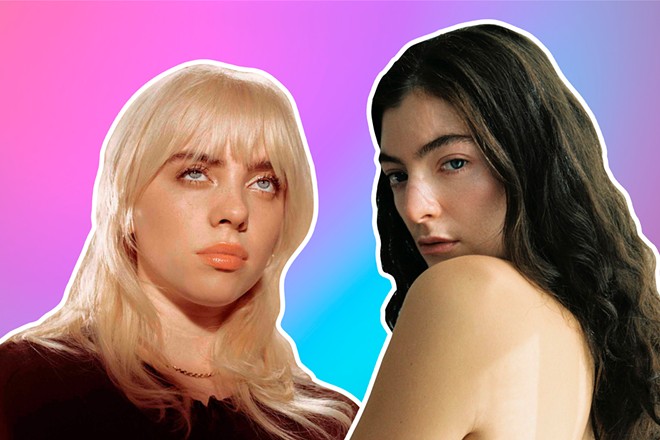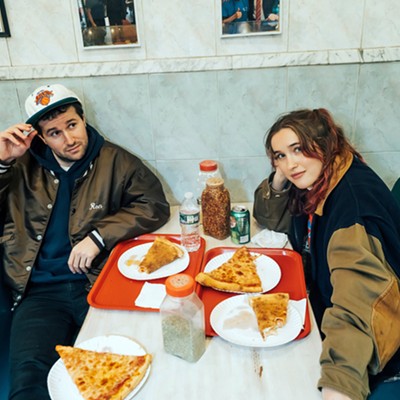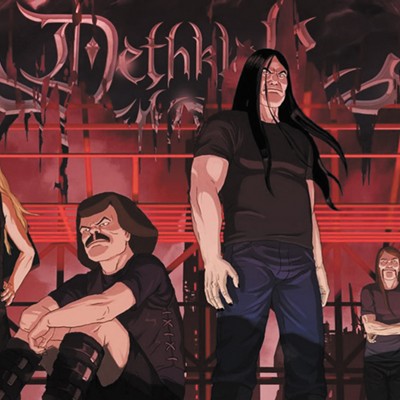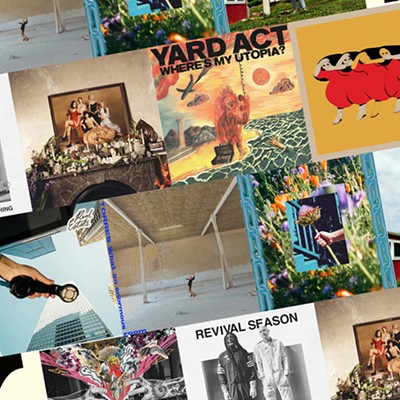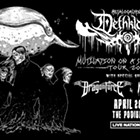What constitutes a miss for a pop star these days? The music industry is built in such a wildly unbalanced way that the biggest names are essentially too big to fail. Even if the public isn't demanding an artist's current batch of tunes, they'll still be placed in enough commercials, move enough presale merch and have a loyal enough hive of stans for any problems to feel like only a minor speed bump.
That said, if you told me before the year started that Lorde and Billie Eilish would release new albums in 2021, and neither would capture the pop zeitgeist as much as an actor from the Disney+ High School Musical reboot (Oliva Rodrigo) or Doja Cat, I would've been beyond stupefied. The idea that their albums wouldn't fully connect with audiences was hard to fathom.
That's because up to this point, both Eilish and Lorde possessed the same musical superpower that distanced themselves from their contemporaries: relatability.
It's a quality that has to just come naturally and that when faked can seem like the most off-putting quality imaginable. Hitting the scene as teens in the age of bedroom music creation meant both got to be relatively unfiltered young women, rather than brands built by corporate machines. They got to be artistically unkempt kids, which is exactly what other messy teens connect with authentically.
But their appeal wasn't only limited to young female pop consumers. Lorde's "Royals" got some play on hip-hop radio stations (which was odd since it's a mild critique of bling culture). The approval rating of her Pure Heroine and Eilish's When We All Fall Asleep, Where Do We Go? among typically close-minded old rock dudes was off the charts. Why was that?
People like to make the case that lyrics don't actually matter in modern music, that they generally go in one ear and out the other. You can know only the wrong words to "Smells Like Teen Spirit," but it still resonates. But even if people aren't registering the actual words, they're subconsciously taking them in. And it seems like commercial success may have been an artistic tipping point that's caused both Lorde and Eilish to veer into territory divergent from their previously unparalleled relatability.
One of Lorde's great strengths was how she managed to convey a young woman's perspective on Pure Heroine and Melodrama essentially without employing any gendered songwriting. Apart from putting on makeup on "Green Light" and asking to be called queen bee on "Royals," there simply isn't language that excluded any listener from putting themselves in her lyrical angst. The daydreaming tone that permeated Lorde's work never felt disconnected from a universal experience.
That's simply not the case on her new Solar Power. The album opening "The Path" literally has lines about "teen millionaire having nightmares from the camera flash" and not taking calls "if it's the label or the radio." Not exactly relatable. Lorde was a millionaire when writing Melodrama, but she never let it seep in. Solar Power is an album that radiates (seemingly unintended) bougie aloofness, where being "Stoned at the Nail Salon" is treated as something folks can identify with rather than a niche thrill for the comfortable class. The album has an overarching escaping-to-an-island theme that pops up repeatedly on songs like "Leader of a New Regime," but the tone misses its mark, seeming more like a brag than bringing listeners along for the escapism (the pandemic timing doesn't help the contextualization, as us normies in lockdown couldn't jet off to isles).
The relatability void extends to the music backing the sung word. While Pure Heroine felt like a kid trying to escape the confines of her room through urgent electronic simplicity, and Melodrama felt as frantic, pulsating and blissfully blurry as a drunken late night on a dance floor, the chilled-out acoustic guitar-driven Solar Power often feels like a throw-away afternoon beachside jam devoid of earworm melodies.
Eilish wrote from a more distinctly feminine perspective on her breakthrough When We All Fall Asleep..., but she tapped into an extremely universal sense of alienation. At the same time, she was clearly a kid screwing around and doing weird things for fun rather than commercial viability. Heck, that debut LP starts with a track of her and her brother goofing around about taking out her Invisalign to sing and features a track that could've been a killer single turned wonky with a bunch of samples from The Office ("My Strange Addiction").
Her new Happier Than Ever, on the other hand, feels like a streamlined major label product, which makes for a strange fit considering much of the album dwells on how the music industry exploits young women ("Your Power," "Goldwing," etc.). It's a valid topic for Eilish to explore, but it's not shocking the masses don't find those specifics nearly as relatable (the superstar perspective on "NDA" doesn't help). A couple tunes like "My Future" still capture the youthful dreamer vibe, but much of the album feels distant from the common listener.
Similar to Lorde, there's also a musical dropoff on the new album. The stylistic dexterity Eilish and her producer brother, Finneas, displayed on When We All Fall Asleep... was frankly astounding: the chest-rattling bass thump of "Bad Guy," the knife-sharpening hook of "You Should See Me in a Crown," piano ballads ("Listen Before I Go"), depressed teen hymnals ("When the Party's Over"). Compare that to Happier, which... mostly just sounds like uninspired generic versions of the prior record while also attempting to sound more "grown up"? It has all the hallmarks of famed sophomore-slump albums where artists use up the best ideas they've been cobbling together for years on their debut, only to have a relatively empty cupboard of ideas for round two.
Maybe relatability just has a shelf life for pop stars. It's easier to be musically approachable when "writing what you know" is teenage daydreams rather than the pressure under the public microscope. Neither superstar is going to be too rattled by the fact that they're not dominating the musical narrative this year.
Still, one can hope for a little more dreamy stargazing and a little less looking at stardom in the future. ♦

